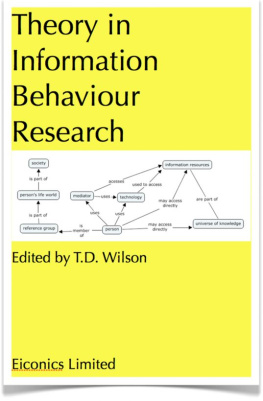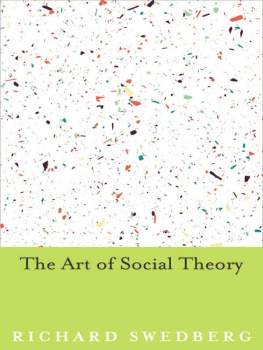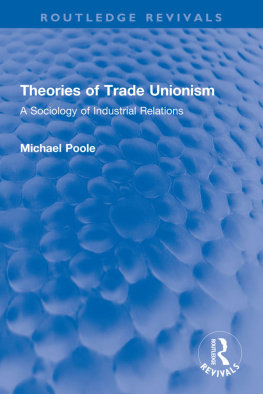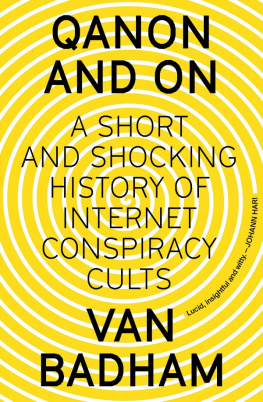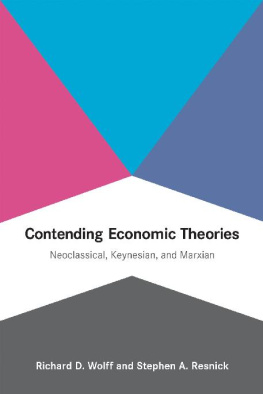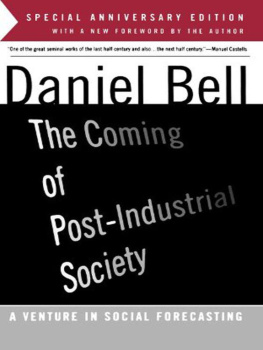ROUTLEDGE LIBRARY EDITIONS:
SOCIAL THEORY
Volume 88
THEORIES OF INDUSTRIAL SOCIETY
THEORIES OF INDUSTRIAL SOCIETY
RICHARD J. BADHAM
First published in 1986
This edition first published in 2015
by Routledge
2 Park Square, Milton Park, Abingdon, Oxon, OX14 4RN
and by Routledge
711 Third Avenue, New York, NY 10017
Routledge is an imprint of the Taylor & Francis Group, an informa business
1986 Richard J. Badham
All rights reserved. No part of this book may be reprinted or reproduced orutilised in any form or by any electronic, mechanical, or other means, nowknown or hereafter invented, including photocopying and recording, or in anyinformation storage or retrieval system, without permission in writing from thepublishers.
Trademark notice: Product or corporate names may be trademarks or registeredtrademarks, and are used only for identification and explanation without intentto infringe.
British Library Cataloguing in Publication Data
A catalogue record for this book is available from the British Library
ISBN: 978-0-415-72731-0 (Set)
eISBN: 978-1-315-76997-4 (Set)
ISBN: 978-1-138-78298-3 (Volume 88)
eISBN: 978-1-315-76318-7 (Volume 88)
Publishers Note
The publisher has gone to great lengths to ensure the quality of this reprint butpoints out that some imperfections in the original copies may be apparent.
Disclaimer
The publisher has made every effort to trace copyright holders and wouldwelcome correspondence from those they have been unable to trace.
Theories of
Industrial
Society
Richard J. Badham
1986 Richard J. Badham
Croom Helm Ltd, Provident House, Burrell Row,
Beckenham, Kent BR3 1AT
Croom Helm Australia Pty Ltd, Suite 4, 6th Floor,
6476 Kippax Street, Surry Hills, NSW 2010, Australia
British Library Cataloguing in Publication Data
Badham, Richard J.
Theories of industrial society.(Croom Helm
international series in social and political thought)
1. Sociology 2. IndustrySocial aspects
I. Title
303.4 HM51
ISBN 0-7099-3921-3
The author and publishers would like to thank
Sage Publications for permission to reproduce material from
Current Sociology, Vol. 32, No. 1 Spring 1984:
Sociology of Industrial and Post-Industrial Societies.
To Crcy
and the end of an era
Printed and bound in Great Britain by
Biddles Ltd, Guildford and Kings Lynn
CONTENTS
In schools and universities we are presented with the powerful image of the Industrial Revolution as the great growling engine of change launching the world into the modern era. Like the French Revolution, this image of the Industrial Revolution has attained enormous symbolic significance. Whereas the French Revolution became a symbol of mans capacity to shape society according to the dictates of Reason, the Industrial Revolution became a symbol of mans increasing technological power and capacity to harness the forces of nature.
In both cases, however, democratic and technological achievements were marred by widespread violence, inhumanity and suffering. The French revolution became a locus classicus for power abuse and rule by terror, all originating from untempered political idealism and unregulated mass action. The Industrial Revolution came to stand for the fragmentation of society and the dehumanisation of man, the poverty and ugliness of proletarian life, the spirit of disenchanted calculation and crass commercialism. Worship of the Age of Reason merged with fear of the Reign of Terror; praise of the Age of Industry went hand in hand with hatred of the dark satanic mills with an aversion to the perversity of Faustian man.
This view of the Industrial Revolution is directly linked to a set of images of industrialism, industrialisation and industrial society. In the popular mind the image of an industrial Leviathan marching through history often provides a general, if only vaguely formulated, perspective on world history and contemporary societies. The great divide between pre-industrial and industrial societies is commonly assumed to be the main bridge separating modern societies from the past, distinguishing developed from underdeveloped states in the present era. This image of industrial society has played a dominant role in the social sciences. In history, politics and economics, as well as in sociology, the idea of industrial society provides the background for discussions of modern history, power in contemporary societies, market economies and economic growth. Yet in recent years this image has been increasingly challenged. A number of critics have condemned the technocratic consciousness and ideology of industrialism associated with this perspective (Dickson 1974; Roszak 1973). In addition, the last decade witnessed a more systematic critique of the theory of industrial society within the social sciences (Giddens 1982; Salaman 1981; Scott 1979). Uniting both sets of criticisms is a reaction against the cruder image of industrial society as providing both an explanation of the structure and change of modern societies and as an ideal for guiding and directing future social development.
Beyond the limited confines of academic discourse, the classical image of industrial society has played an important role in structuring contemporary social identity and political programmes. In the less affluent world, there is the widespread concern to industrialize. In the more affluent world there is an uneasy combination of a desire to re-establish post-war levels of economic growth with an increasing awareness of the many limits of growth and diseconomies of scale. Influenced by the traditional images of industrial society, these issues are often presented in terms of industrialize and be damned or industrialize or be damned. There appears either a commitment to growth, voiced in terms of the need to industrialize and the impossibility of turning back or a radical critique of the inherent ills of the mechanised iron cage of an inhuman industrialism.
The image of industrial society, to the extent that it actively promotes such a view, severely restricts the social imagination. Yet the influence of the image of industrial society is even wider than its support of the more extreme technocratic and technophobic approaches to economic progress. It has continued to provide the background images and set of assumptions that underlie a wide variety of contemporary discussions of economic development and social progress even amongst those more aware of the limitations of the traditional images of industrialism. Immense significance is still attached to unilinear industrial development as the ultimate key to all progress. In this way, we shall argue, it obscures the social structures and power relationships responsible for selecting the form and direction of technology and growth. Equally significantly, it prevents reflection on the need for technological and economic choice, and hinders widespread public debate on the criteria to be used in making such choices.
The present discussions of the theory of industrial society and the ideology of industrialism obtain wider significance against this general background of reaction against crude images of industry as a guide for the future. Yet the social scientific critiques of industrial society theory have generally failed to address the major issue that this raises. They have condemned the industrial perspective on modern states for its evolutionist, functionalist, technicist or positivist excesses. These criticisms, as we shall see, are richly deserved. They do not, however, grasp the central purpose, and hence appeal, of industrial society theory. They have left relatively unchallenged the more general assumption that it is still industrialization that crucially separates past from present. The many important variants of this general industrial society theory all share the one basic assumption: that a number of modern states are fundamentally industrial societies and that social investigation and political action are, or should be, centrally concerned with understanding and attending to the implications of this fact.






